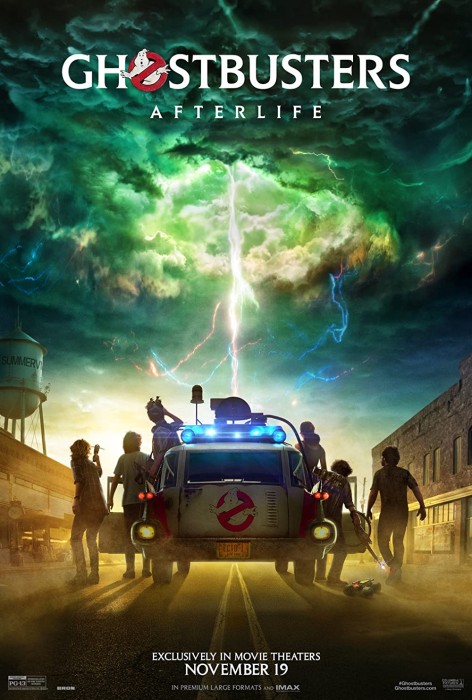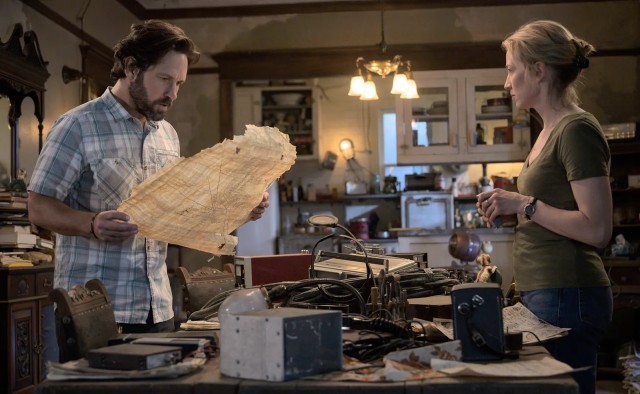Ghostbusters: Afterlife Movie Review
 |
Ghostbusters: Afterlife
Theatrical Release: November 19, 2021 Running Time: 124 Minutes Rating: PG-13 Director: Jason Reitman Writers: Jason Reitman, Gil Kenan (screenplay); Dan Aykroyd, Harold Ramis (characters) Cast: Carrie Coon (Callie Spangler), Finn Wolfhard (Trevor Spangler), Mckenna Grace (Phoebe Spangler), Paul Rudd (Gary Grooberson), Logan Kim (Podcast), Celeste O'Connor (Lucky Domingo), Bokeem Woodbine (Sheriff Domingo), Tracy Letts (Jack), Olivia Wilde (Gozer the Gozarian), J.K. Simmons (Ivo Shandor), Bill Murray (Peter Venkman), Dan Aykroyd (Ray Stantz), Ernie Hudson (Winston Zeddemore), Annie Potts (Janine Melnitz), Sigourney Weaver (Dana Barrett), Josh Gad (voice of Muncher) |
Whenever journalists asked Jason Reitman if he'd ever direct a Ghostbusters movie, the answer was always the same. Reitman had no interest in following in his father Ivan's footsteps. But that was when Jason was the young and celebrated director of Thank You for Smoking, Juno, and Up in the Air. The decade since earning his four Academy Award nominations has not been kind to the younger Reitman, through little fault of his own. Suddenly, there seemed to be mutual interest between a Ghostbusters reboot and Reitman. In an age where IP rules all, Ghostbusters has remained more or less the crown jewel in the Sony library. And yet the jewel was dormant and 2016's all-female reboot directed by Bridesmaids' Paul Feig was more or less hated by everyone, not just misogynists. Suddenly, the studio that had just run their Men in Black franchise into the ground and the director needing some commercial pep in his step came together and agreed to try to make Ghostbusters great again. One of the most successful films of the 1980s, Ghostbusters was beloved by a generation and its excellent sequel is more widely appreciated in the real world than its online ratings suggest. But the '90s came and went and of the key personnel, only wisecracking star Bill Murray remained in demand and even then less as marquee star and more of an indie scene icon who didn't return many calls that weren't from Wes Anderson or Jim Jarmusch.
Without Murray, there was no Ghostbusters and Murray didn't want to make another Ghostbusters, despite appearing onstage at an awards show in uniform, breaking out the jumpsuit and proton pack for his hilarious Zombieland cameo, and reprising his signature role of Peter Venkman for a high-profile video game conceived by Ghostbusters writers/co-stars Dan Aykroyd and Harold Ramis. Ramis' death in early 2014 seemed to be a nail in the coffin of a standard Ghostbusters 3. But then Feig's movie underperformed and instead of retiring the line, Sony and Reitman came up with Ghostbusters: Afterlife, a revival and follow-up that felt right based on Reitman assuming the director's chair his father twice held and himself being an innovative filmmaker who could breathe new life into this old line.
I'm happy to report that Afterlife is mostly a success and a decided improvement over the 2016 reboot. For me, it never had a fair chance of reaching the heights of the original two movies, which have ranked among my favorites for as long as I can remember and I have watched as much as any movie over the years. While this new quasi-threequel Ghostbusters doesn't quite dazzle the way that Star Wars: The Force Awakens and Blade Runner 2049 did in the similarly long-lapsed series, it qualifies as quality entertainment with broad appeal.
Interestingly, Reitman opts for a tone quite far from his father's. There are long stretches of this movie where you forget it's a comedy as jokes fly less frequently than they do in a Michael Bay blockbuster. That's not objectionable because the younger Reitman's work has always had a different sensibility than his father's and if Ivan's brand of comedy were still in style, he would still be making it instead of just occasionally producing stuff. (In fairness, he did turn 75 last month.)
The opening scenes of Afterlife present a somewhat believable look at the twilight years of a familiar silhouette kept in the shadows. One of the original Ghostbusters has moved to the middle of nowhere Oklahoma where he still clings to scientific curiosity, investigating oddities while apparently anticipating the end of the world. Egon's death affects our central family of three, consisting of Callie (Carrie Coon), the daughter he never knew, and her two children, the brainy yet socially awkward 12-year-old Phoebe (Mckenna Grace) and gangly 15-year-old Trevor (Finn Wolfhard, "Stranger Things"). Broke and facing eviction, the Spanglers head to Oklahoma expecting to inherit at least enough to scrap by. When they learn all they've inherited is the old man's debt, it becomes a reluctant relocation which sees the two kids starting summer school immediately for some reason.
There, our attention mainly remains on Phoebe, who befriends seismologist Mr. Grooberson (a characteristically affable Paul Rudd), the kind of cool teacher whose curriculum consists of VHS showings of Cujo and Child's Play; as well as Podcast (Logan Kim), a self-documenter with a taste for unsolved mysteries. Naturally, they discover the legacy of Phoebe's grandfather, complete with finding some of the old tools of the trade (the PKE meter! the ghost trap! the proton pack!) that they are able to restore to working order.
Reitman's love and respect for his father's biggest hits are apparent. He leans heavily on the musical themes created for the original film by the late, great Elmer Bernstein. If you've seen the movie as much as I have, then the recycled cues will conjure many fond memories for you. Bernstein's compositions, Juggling comedy and sci-fi action is not as easy as movies like Ghostbusters, Men in Black, Galaxy Quest, and Thor: Ragnarok make it look. So one doesn't mind that Reitman largely plays the proceedings straight, evoking the likes of "Stranger Things" and J.J. Abrams' Spielberg-inspired Super 8 rather than attempting a parade of jokes.
In his obligatory introduction to the advance critics-only screening, Reitman begged us not to spoil the movie, which makes it difficult to discuss the latter parts and assess it as a whole. You know going in that if the Feig female Ghostbusters was able to round up the original cast members for cameos then Reitman's more direct follow-up would be able to do the same. And it does, this time letting Aykroyd be Ray Stantz, Murray be Venkman, Annie Potts be Janine Melnitz and so on. Afterlife is all about following the first movie and other than a sighting of Ray's occult book shop, there's unfortunately little evidence that Ghostbusters II exists. Meanwhile, Feig's film does not seem to exist at all in this universe, based on a throwaway line by Rudd that there haven't been any Ghostbusters in over thirty years.
For the Ghostbusters fan, Afterlife is a nostalgic experience. Reitman is undoubtedly inspired by the movies he grew up watching in the '80s and not just his father's. Inexplicably, there are miniature Stay-Puft Marshmallow men that are like Gremlins and another scene directly pays homage to Back to the Future. And yet, you don't have to be an '80s kid pushing forty now to enjoy this. The proceedings are contemporary and in good taste, valuing story, atmosphere, and lore over effects showcases or trying to develop further sequels. (That said, the effects are surprisingly excellent, particularly the eerie illusion of debatable ethics that I can't talk about.) With there being an entire production company formed in 2015 to develop Ghostbusters movies (Sony's Ghost Corps), it seems quite likely this is not the end of the franchise. But it could very well be the last time we see Murray and company playing these iconic roles that have entertained so many for so long. While I didn't love this incarnation enough to need it to continue (it trips up a little near the end, relying too much on reprised concepts), I absolutely wouldn't mind if it did. There's more to admire and enjoy here than in a lot of modern-day tentpoles and just about every one of the year's biggest hits.
If you like Ghostbusters, you'll want to stick around to the end of the end credits to see more of the returning cast, including appearances by Sigourney Weaver and Ernie Hudson. That does mean enduring the end credits' original theme tune performed by Grace herself.
|
Related Reviews:
DVDizzy.com | DVD and Blu-ray Reviews | Search This Site
DVDizzy.com Top Stories:
Now in Theaters: Eternals • King Richard • The French Dispatch • Last Night in Soho
Directed by Jason Reitman: Tully • The Front Runner • Young Adult • Labor Day • Men, Women & Children • Juno
Men in Black International • Ghostbusters (2016) • Galaxy Quest • Thor: Ragnarok
Text copyright 2021 DVDizzy.com. Images copyright 2021 Sony, Columbia Pictures, and Ghost Corps.
Unauthorized reproduction prohibited.

